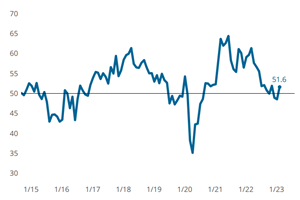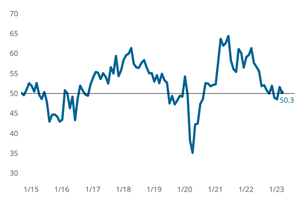Gardner Business Index at 55.3 in February
Business expectations soar as the US composites industry posts growth in every geographical area.
With a reading of 55.3, the Gardner Business Index (GBI) in February 2017 showed that the composites industry in the US had grown at an accelerating rate for a third straight month. In fact, the industry grew in February at its fastest rate since May 2014. And in the second half of 2016, the Index showed that the industry had performed its best since the first half of 2015. Given other economic trends, this should be a positive sign for the US composites industry for the remainder of 2017.
New orders grew at an accelerating rate in February for a third month in a row as this subindex reached its highest level since May 2014. The production subindex also continued to grow but at a slightly slower rate. The backlog subindex increased for the first time in a year and only the third time since May 2014. But this subindex has trended up since July 2015, which indicated increasing capacity utilization in 2017. Employment increased for the seventh consecutive month. Exports decreased after two months of growth. Supplier deliveries lengthened significantly in both January and February.
Since April 2016, material prices had increased at a consistently strong rate — this subindex remained just below 60 in most months all the way through the end of 2016. But, in January and February of this year, material prices increased at an even faster rate. The rate of increase in February, in fact, was at its fastest since the GBI survey was first recorded in December 2011. Prices received increased at an accelerating rate for a fourth month in a row. The subindex had trended up since January 2016. Future business expectations remained strong, with the subindex riding above 80 for a third straight month.
In terms of markets served, two of the US composites industry’s most watched sectors posted notable growth in February. The aerospace subindex grew for the sixth time in eight months. By month’s end, the aerospace index had been above 60 in two of the previous three months. The automotive subindex also grew, and did so for a third month in a row, although the growth rate was minimal in both January and February.
Regionally, the US composites industry posted growth across all geographical divisions. The North Central-East was the fastest growing region for the fourth time in five months, although in February, the North Central-West expanded almost as fast. The Southeast, West, South Central and Northeast all recorded solid growth in February.
As February closed out, US composites manufacturing facilities with more than 250 employees were showing growth for a fourth month in a row, and plants with 100-249 employees had demonstrated strong growth for seven months without a break. Companies with 50-99 employees, however, showed contraction for the second time in four months. But those with fewer than 20-49 employees posted accelerating growth in February for a third straight month. Manufacturers with fewer than 20 employees showed growth for the first time since August 2016 and recorded their fastest rate of growth since February 2015.
Related Content
Composites industry index ends February in growth mode
The GBI: Composites Fabricating closed February at the same level it was in November 2022, right before experiencing a rare two months of contraction.
Read MoreComposites market shows signs of stabilizing as future outlook brightens
Improving supplier deliveries and strong future business index point to opportunities ahead.
Read MoreComposites industry index was flat for March
The GBI: Composites Fabricating closed March flat, losing 1.3 of the 3.1 points gained in February.
Read MoreComposites industry GBI contracted faster in July
The GBI: Composites maintains its consistent downward trend for the fifth month in a row.
Read MoreRead Next
All-recycled, needle-punched nonwoven CFRP slashes carbon footprint of Formula 2 seat
Dallara and Tenowo collaborate to produce a race-ready Formula 2 seat using recycled carbon fiber, reducing CO2 emissions by 97.5% compared to virgin materials.
Read MoreVIDEO: High-volume processing for fiberglass components
Cannon Ergos, a company specializing in high-ton presses and equipment for composites fabrication and plastics processing, displayed automotive and industrial components at CAMX 2024.
Read MoreDeveloping bonded composite repair for ships, offshore units
Bureau Veritas and industry partners issue guidelines and pave the way for certification via StrengthBond Offshore project.
Read More
.JPG;width=70;height=70;mode=crop)





















